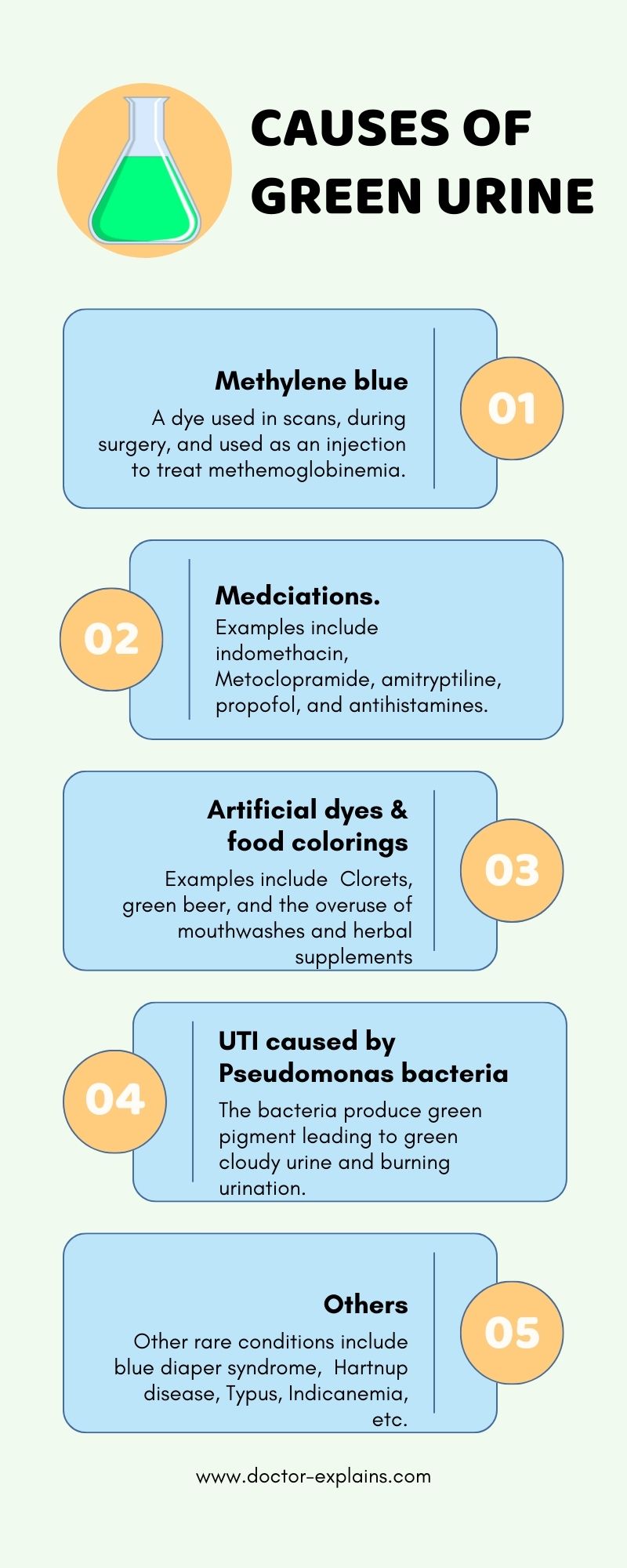Urine color changes can offer invaluable insights into our overall well-being.
While green urine is a rare phenomenon, it may occasionally be linked to certain vitamins or other factors.
This article will explore the potential causes of green urine, with a focus on vitamins’ role, and offer guidance on when to consult a healthcare professional and when to worry.
The Short Answer:
Green urine can be due to certain vitamins at play, particularly B complex supplements, and riboflavin (vitamin B2). However, it’s not worrisome. Other factors that might lead to green urine include medications, medical conditions, or consumption of specific foods. If urine color concerns you, seeking further evaluation and guidance from a healthcare provider is advisable.
Bullet summary of the article:
- Green urine can possibly be caused by vitamin B complex supplements
- Riboflavin (vitamin B2): a well-known culprit for green urine
- Vitamins-related green urine: no need for alarm
- Other potential green urine causes
- When green urine should raise concerns
Vitamin B complex supplements may cause green urine
It’s unusual for vitamins to turn urine green, but some B complex supplements could result in this peculiar hue. The greenish can tinge in urine is often due to the presence of vitamin B2 (riboflavin) in the vitamin supplements.
Also, certain manufacturers use food dyes to give their products a distinct look. Consequently, a temporary change in urine color might follow their consumption.
Riboflavin (vitamin B2) is famous for causing green urine.
Riboflavin, or vitamin B2, is a water-soluble vitamin with a vital role in energy production, as well as the metabolism of fats, proteins, and carbohydrates. In excessive amounts, riboflavin can turn urine yellowish-green. Why? The body eliminates surplus riboflavin through urine, and when the vitamin’s fluorescent yellow color mixes with urine’s natural yellow hue, a greenish appearance emerges.
Keep in mind, though, that riboflavin-induced greenish urine is generally harmless and temporary. Once the body expels the excess vitamin, urine color should normalize.
Green urine due to vitamins is not a cause for concern
For the most part, green urine from vitamin intake shouldn’t raise any red flags. It’s temporary and usually harmless. However, adhering to the recommended daily allowances for vitamins is key to avoiding excessive consumption. If vitamin intake or urine color is a concern, seek guidance from a healthcare provider.
Other possible causes of green urine
Vitamins might be one potential cause of green urine, but other factors can also lead to this atypical color.
The table below summarizes other causes of green urine. Learn more in this detailed article about green urine.
| Causes | Description |
|---|---|
| Methylene Blue Dye | Used during radiological scans, surgery, and to treat Methemoglobinemia. It can cause green urine as the blue pigment combines with the yellow urine pigments. |
| Medications | Many drugs contain green or blue chemicals that appear in the urine, leading to a green or lime urine color. Examples include Indomethacin, Metoclopramide, Amitriptyline, Propofol, Promethazine, Cimetidine, Metronidazole, and others. |
| Artificial Dyes | Often present in food colorings and some herbal and traditional medicines. Examples include Methylene blue, Boric acid, Carbolic acid, Evans blue, Flavine derivatives, Food colorings, Indigo blue, and Indigo carmine. |
| UTI caused by Pseudomonas | Caused when bile ducts become obstructed, leading to increased bilirubin levels in the blood, which passes through the kidney. In chronic cases, bilirubin breaks down into another substance called biliverdin, causing green or greenish-brown urine. Causes include gallstones obstructing the common bile duct, pancreatic head cancer, common bile duct strictures. |
| Chronic Obstructive Jaundice | Caused when bile ducts become obstructed, leading to increased bilirubin levels in the blood, which passes through the kidney. In chronic cases, bilirubin breaks down into another substance called biliverdin, causing green or greenish-brown urine. Causes include gallstones obstructing the common bile duct, pancreatic head cancer, and common bile duct strictures. |
| Other Rare Causes | Certain rare diseases and substances can also lead to green urine. These include Blue diaper syndrome, Hartnup disease, Indicanemia, Meconium aspiration syndrome, Typhus, Vesico-enteral fistula, Arbutin, Azuresin, Blutene, Bromoform, Thymol, Tetralin, Phenol, Tolonium. |

When to worry about green urine
Although vitamins- or diet-related green urine is typically harmless, be mindful of accompanying symptoms that might coincide with the color change.
If pain, discomfort, or other unusual symptoms are present, seek further evaluation from a healthcare provider.
If your urine’s greenish hue persists over a few days or raises health concerns, it’s always wise to seek medical advice.
A healthcare provider can help pinpoint the cause of the green urine and offer appropriate guidance and treatment, if necessary.
To conclude, green urine might occasionally be linked to vitamin intake, especially B complex supplements, and riboflavin.
However, it’s generally not a cause for concern. If green urine occurs alongside other symptoms or raises health concerns, seek guidance and further evaluation from a healthcare provider. Grasping the potential causes of green urine and knowing when to worry can help ensure you maintain optimal health and well-being.





